

5_Gonzalez. Vertimo studijos eISSN 2029-7033 2019, vol. 12, pp. 71–86 DOI: Ramón Méndez GonzálezUniversity of Vigo, Spainrmendez@uvigo.es Abstract: The video game industry is growing at a very fast pace.
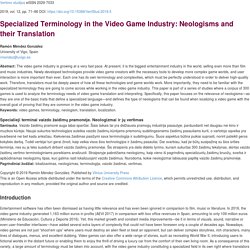
At present, it is the biggest entertainment industry in the world, selling even more than film and music industries. Newly-developed technologies provide video game creators with the necessary tools to develop more complex game worlds, and user interaction is more important than ever. Specialieji terminai vaizdo žaidimų pramonėje. Santrauka. Copyright © 2019 Ramón Méndez González. Introduction Entertainment software has often been dismissed as having little relevance and has even been ignored in comparison to film, music or literature. Understanding terminology in the video game industry This paper aims to analyze one of the most basic aspects that must be taken into account when working for the video game industry: the specialized terminology that can be found in this field. A. B. C. D. Translating games for smartphones in translation classrooms.
The Ins and Outs of Video Game Subtitling. View of Game on! Burning issues in game localisation. Researchgate. El error de traducción en la localización de videojuegos: estudio descriptivo y comparativo entre videojuegos indie y no indie. Esta tesis doctoral pertenece al ámbito de la Traductología y, concretamente, se incluye dentro de los estudios sobre la TAV (traducción audiovisual).

La investigación que llevamos a cabo consiste en un estudio descriptivo y comparativo sobre la presencia de errores de traducción en videojuegos indie y no indie que han sido traducidos de inglés a español. La localización de videojuegos, etiqueta bajo la cual se recoge la práctica de traducir estos productos, supone un objeto de estudio productivo para abordar un fenómeno omnipresente en todas las modalidades traductoras, como es el de error de traducción, dadas las características intrínsecas de los videojuegos y de los textos que los componen. En nuestra investigación, nos preguntamos, entre otras cosas, si los errores de traducción presentes en los títulos indie y no indie son diferentes, tanto a nivel cualitativo como cuantitativo. "Eat Your Hamburgers, Apollo": A Survey of Japanese Video Game Localization Methods and Challenges.
The Position of Game Localization Training within Academic Translation Teaching. Bernal Merino, Miguel A. (2006).

On the translation of video games. The Journal of Specialized Translation", (pp. 22-36). 03.09.2015. Bernal Merino, Miguel A. (2015). Translation and localisation in video games: Making entertainment software global. New York and London: Routledge. Bowker, L. (2005). Chandler, H. Crespo-Jiménez, Miguel A. (2010). Koby, G.S and Baer B. Mangiron., C. (2007). Quasi - medieval register in video games – a translator’s perspective. International Conference on Translation and Accessibility in Video Games.
The video game industry has become a worldwide phenomenon, generating millions in revenue every year.
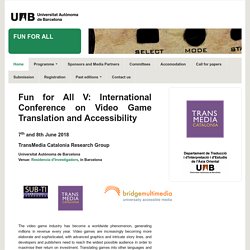
Video games are increasingly becoming more elaborate and sophisticated, with advanced graphics and intricate story lines, and developers and publishers need to reach the widest possible audience in order to maximise their return on investment. Translating games into other languages and designing games that can be played for a wide spectrum of players, regardless of their (dis)ability, are two obvious ways to contribute to increasing the audience for the game industry.
Translating Video Games - The Localisation of Uncharted: Drake's Fortune. The State of Play. "How Difficult Can That Be?" - The Work of Computer and Video Game Localization. 1.
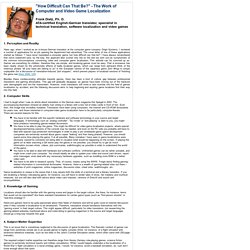
Perception and Reality Years ago, when I worked as an in-house German translator at the computer game company Origin Systems, I reviewed a number of applications for an job opening the department had advertised. The cover letter of one of these applications started as follows: “I have never translated a computer game, but how difficult can that be?” I have always remembered that naïve statement (and, by the way, this applicant later scored very low on the test we sent out) as symptomatic of the common misconceptions concerning video and computer game localization. Cultural Localization: Orientation and Disorientation in Japanese Video Games. On the Translation of Video Games. Home > Issue06 > Bernal article On the Translation of Video Games Miguel Bernal Merino, Roehampton University, London Since the development by the MIT of the very first video game called Spacewar in 1962, the video games industry has evolved dramatically to become a worldwide phenomenon worth billions.
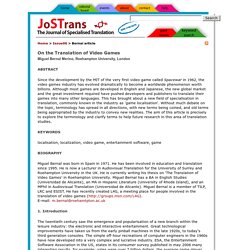
Although most games are developed in English and Japanese, the new global market and the great investment required have pushed developers and publishers to translate their games into many other languages. This has brought about a new field of specialisation in translation, commonly known in the industry as 'game localisation'. Video games as a new domain for translation research: From translating text to translating experience. Exploring translation strategies in video game localization. Game Localisation: Unleashing Imagination with 'Restricted' Translation. Home > Issue06 > Mangiron & O'Hagan article Game Localisation: Unleashing Imagination with 'Restricted' Translation Carmen Mangiron and Minako O'Hagan, Dublin City University, Ireland From its humble beginning in the 1970s, the video games industry has flourished and become a world-wide phenomenon.
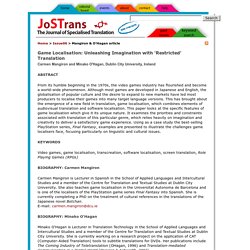
Although most games are developed in Japanese and English, the globalisation of popular culture and the desire to expand to new markets have led most producers to localise their games into many target language versions.